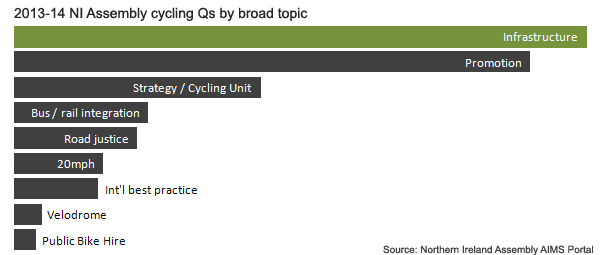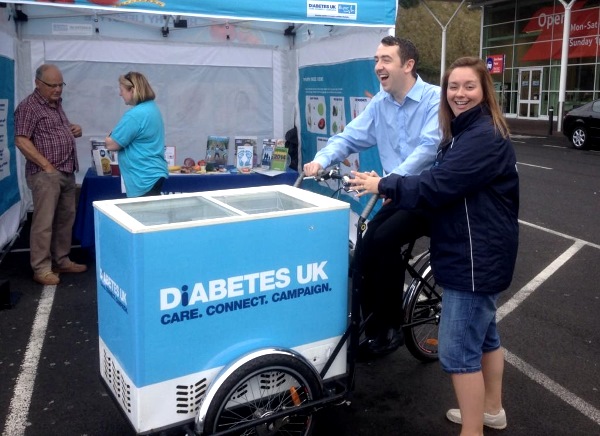
The Northern Ireland Assembly witnessed an unprecedented rise of the bicycle onto the political agenda in 2013-14. Even the expected boost from the Giro d’Italia couldn’t mask an emergence of everyday cycling issues being promoted by more politicians than ever before. But could anyone unseat the DUP’s Peter Weir as the 2-time reigning, defending Cycling MLA of the Year?
In September 2013 Stormont was hit by a barrage of cycling questions so fierce and unexpected that it was dubbed Cyclegeddon.
Events moved fast – already an All-party Group on Cycling had been formed; within 5 weeks of the new term more Assembly questions on cycling were asked than in the whole of the previous year; the Transport Minister Danny Kennedy announced the formation of a new Cycling Unit to lead his Cycling Revolution; by the end of the year a remarkable 324 Assembly Questions (Written, Oral, Topical and supplementary) had been asked; and one MLA rose through the ranks to focus minds on everyday cycling issues, almost single-handedly creating Cyclegeddon and in the process landing a knock-out blow to claim the title of..
Cycling MLA of the Year 2014: Daithí McKay (Sinn Féin)

Daithí spoke to @nigreenways about his win:
“It’s a great honour to receive this award especially given the fact that this has been the year that the Assembly really did wake up to cycling. I only took up cycling again in August 2013 when I bought a £180 Viking and I was immediately bitten by the bug. After a few weeks I noticed a reduction in stress, an increase in productivity, more energy, less weight and more money in my pocket!
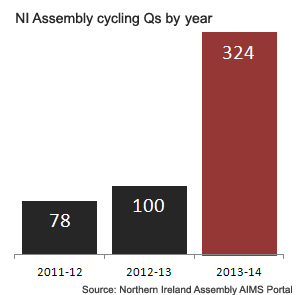 “What I like most about cycling is that it represents a solution to so many of our problems – an ever worsening state of public health, transport and congestion, mental health and stress, increasing fuel overheads. We have so much potential to realise in terms of cycling and there is a huge demand for it that we can release if we deal with safety and the perception of safety.
“What I like most about cycling is that it represents a solution to so many of our problems – an ever worsening state of public health, transport and congestion, mental health and stress, increasing fuel overheads. We have so much potential to realise in terms of cycling and there is a huge demand for it that we can release if we deal with safety and the perception of safety.
“Cycling is now firmly on the political agenda and there is an onus on all elected representatives to ensure that we firstly ‘understand’ cycling and secondly deliver proper infrastructure. A proper cycling strategy with proper funding will deliver better health outcomes and we all need to contribute to a greater public understanding of that fact.”
The sustained level of badgering Ministers is worth repeating. Daithí’s total of 127 cycling questions is an average of 3 per week during the Assembly term; it’s more questions than the rest of the top 10 Cycling MLAs of the Year combined. It’s also a 3-figure increase on Peter Weir’s winning totals in the last 2 years (23 and 27).
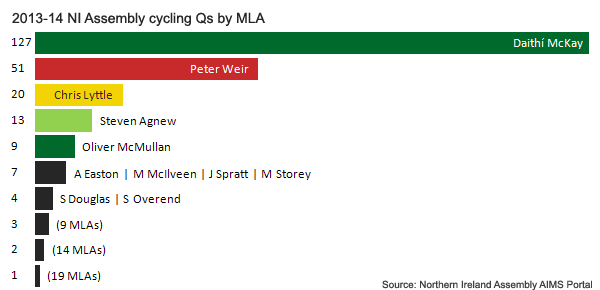
That long tail is also impressive – 2 years ago just 28 of our 108 MLAs asked a question about cycling. This year’s total of 53 MLAs means almost half of our political representatives have joined the swelling peloton.
Daithí McKay’s efforts pushed Sinn Féin into top spot among the political parties, rising from the oblivion of just a single question 2 years ago. Steven Agnew continues to ensure the Green Party punches well above its weight, while there were notably no questions about cycling from NI21, TUV, UKIP or Independent MLAs. Read more about NI parties’ cycling policies in Election Cycle.
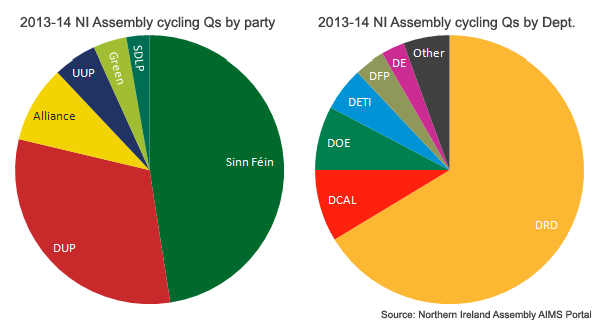
DRD naturally took the brunt of Cyclegeddon as the Department which leads on road infrastructure, but each of the 12 Northern Ireland Government Departments featured in the list, with even the Assembly Commission being pestered about implementing the Cycle to Work Scheme at Stormont.
A little less cycle promotion, a little more action please..
Cycling promotion has arguably been the primary focus in NI over the last decade, save for some fantastic focused government investment in facilities like the Comber Greenway. But with increasing recognition that physical changes will be needed to deliver the cycling revolution, questions on infrastructure nudged into the lead in 2013-14. Pat Ramsey’s 20mph Bill provoked a series of questions and the forthcoming Belfast Bike Hire scheme kept MLAs interested through the year.
The split between questions on sport cycling and everyday cycling was encouraging, especially in the year when the Giro d’Italia rolled through Northern Ireland – MLAs had plenty of questions to ask on the Giro, from criticism of the route to seeking detailed plans for the legacy.
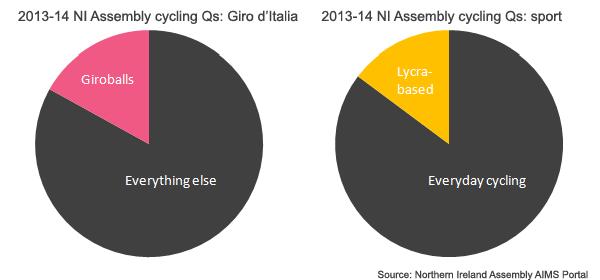
More than just questions
A full Assembly debate on the Giro d’Italia and legacy in April naturally hovered around future sporting opportunities and tourism benefits, but a series of MLAs brought the focus back to everyday cycling and #space4cycling in their contributions.
“That this Assembly recognises that the Giro d’Italia is one of the biggest events in the international sporting calendar; warmly welcomes it to Northern Ireland; acknowledges the significance and magnitude of being chosen to host the Grande Partenza; understands the benefits to be obtained in terms of the economy, tourism, cultural exchange and education, promotion of a healthy lifestyle, and worldwide publicity for Northern Ireland; and calls on the Executive to take all necessary steps to maximise the potential to be gained through such a prestigious event, and to allocate adequate resources for the delivery of a suitable Giro legacy plan to include improved provision and infrastructure for schools, commuting, leisure, tourist and sporting cycling in Northern Ireland.”
Read the full text of the debate on the NI Assembly website.
Cycling debate @niassembly: @Chris_Lyttle on investment & political leadership http://t.co/d4vuUAw2Ly pic.twitter.com/EMBo7OV4rU
— NI Greenways (@nigreenways) April 29, 2014
Stormont cycle debate: @peterweirmla on the cross-departmental way forward http://t.co/d4vuUAw2Ly pic.twitter.com/w7aupYaRWu
— NI Greenways (@nigreenways) April 30, 2014
Cycling debate @niassembly: @over2sandra on kick-starting a cycling revolution http://t.co/d4vuUAw2Ly pic.twitter.com/1sHFRoG89l
— NI Greenways (@nigreenways) April 29, 2014
The Regional Development Committee even got in on the cycling surge by visiting the Great Western Greenway in Mayo and launching its own Inquiry into the benefits of cycling to the economy.
A review of the last year must finish by mentioning the one MLA most responsible for this swirling vortex of cycling issues, the Regional Development Minister Danny Kennedy. From creating the Cycling Unit (which has recently launched a draft Bicycle Strategy for Northern Ireland) to visiting Copenhagen and Malmö on cycling study tours, to hosting cycling events and even taking part on Ride on Belfast – the Minister has continued to take the early steps to fulfil his pledge to create a cycling revolution in Northern Ireland.
NI Transport Minister on his bike in Copenhagen; let's make Belfast cycling this easy @copenhagenize pic.twitter.com/TjYAzCGFNj
— NI Greenways (@nigreenways) March 6, 2014
– – – – – – – – – – – – – – – – – – – – – – – – – – – – – – – – – – – – – – – – – –
Yes, but what were they all asking?
Over 300 questions were asked, but Ministers’ answers are not usually a font of great insight or shocking revelation – that’s the nature of how the system works. But a few nuggets of interesting information could be unearthed. If you want more detail, you can download the full ‘2013-14 Assembly Questions on Cycling’ dataset (XLSX, 166K).
On the restriction of bicycles on trains before 9.30am..
“On very early trains and on contra-commute trains, i.e. trains operating out of Belfast in the mornings, Translink do already regularly carry passengers with bicycles. This is done at the Conductor’s discretion and Conductors have been briefed to accept cycles where capacity permits, i.e. no expectation of standing passengers in the cycle area. However the majority of trains to Belfast operating before 08:00 are already carrying significant numbers of passengers. For information there are no travel restrictions placed on the number of folding bicycles which may be carried on trains. These may be carried at any time, including prior to the normal 09.30 restriction.”
DRD Minister Danny Kennedy answering AQW 25264/11-15 Daithí McKay (also AQW 26579/11-15 Steven Agnew and AQW 34587/11-15 Daithi McKay)
On cycle-specific lights at junctions..
“There are no cycle filter lights currently installed on my Department’s road network. [However..] I am aware the Department for Transport has issued a site-specific authorisation for the use of eye-level cycle traffic lights at Bow Roundabout in London for a trial period. My officials will review the outcome of the trial before making recommendations on their use here.”
DRD Minister Danny Kennedy answering AQW 28890/11-15 and AQW 29558/11-15 Daithí McKay
On missing the point of why 50% of people cycling over Belfast’s Albert Bridge use the footway (objective v subjective safety)..
“The bus lane / cycle facility on the Albertbridge Road, approaching the Albert Bridge, was provided in 1996 to accommodate buses, cyclists and taxis approaching the city centre. The merge arrangement, provided at the end of the bus lane, where the road narrows for the Albert Bridge, is a common layout which operates at other locations in Belfast and elsewhere. Collision records, provided by the PSNI, for this location are monitored, as part of the normal collision data gathering exercise. Over the last five years records show there have been no reported injury collisions at this merge location, involving cyclists.”
DRD Minister Danny Kennedy answering AQW 27035/11-15 Daithí McKay
On the budget allocated to cycling over the last 10 years..
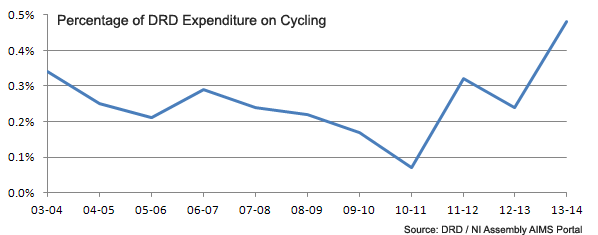
“The recently established Cycling Unit, will seek to coordinate and promote the work being taken forward in relation to cycling and as such, spend on this activity is expected to increase in future years.”
DRD Minister Danny Kennedy answering AQW 26785/11-15 Steven Agnew
On the world famous #BinLane..
“Traffic Attendants patrol Upper Arthur Street several times each day and during the twelve month period to 30 September 2013, six Penalty Charge Notices (PCNs) were issued for contraventions in the cycle lane. However, I understand a further 631 vehicles were recorded but drove away before a PCN could be issued. It is also not clear whether these offences can be attributed to parking in the cycle lane as this information is not recorded.
With regard to bins blocking cycle lanes, this has been reported to Roads Service on a number of occasions. Where a bin has been presented for collection and has obstructed the cycle lane, any complaint will be investigated to establish ownership. My officials have, in the past, spoken to the relevant owners and advised them of their responsibility to ensure that the bin is not placed in the cycle lane, and that once it have been emptied by the collection service, it should be removed from the street immediately after. Where ownership has not been established or where owners have failed to cooperate with my officials, these bins have, with the assistance of Belfast City Council, been removed.”
DRD Minister Danny Kennedy answering AQW 26728/11-15 Daithí McKay
On cycling levels in deprived areas [good idea for a blog post that]..
“[By awesomely mashing up the NI Travel Survey with Deprivation Measures..] It was found that respondents living in the 20% most deprived areas were less likely to have cycled in the last 12 months than the NI population as a whole. Conversely, respondents living in the 20% least deprived areas were more likely to have cycled in the last 12 months compared to the overall NI population. Looking at the respondents living in the remaining areas, there was no real difference in the proportion of those who had cycled in the last 12 months compared to the NI total.
It must be remembered that levels of cycling in specific areas cannot simply be attributed to the level of deprivation, for example the geography of a location can be a contributory factor as to whether people cycle or not. Levels of cycling may also be impacted where low cost, widely available modes of transport such as black taxi ‘bus’ routes are available.”
DRD Minister Danny Kennedy answering AQW 34855/11-15 Daithí McKay
On the total length of cycle lanes in Northern Ireland..
My Department has currently provided approximately 235 miles of cycle lanes across Northern Ireland.
DRD Minister Danny Kennedy answering AQW 30598/11-15 Alex Easton
On cutting a Belfast city centre residential rat run to motor vehicles..
“The closure of Barrack Street, Belfast to through traffic derived from the ‘Belfast On The Move’ strategic review of traffic within Belfast City Centre. Roads Service had previously been aware of local residents’ concerns over the volume and nature of through traffic in this street and took the opportunity to address those concerns within the overall scheme proposal.
Whilst there has been no formal assessment carried out on the specific benefits of the closure of Barrack Street, it is considered the stopping-up has returned the area to being a residential street for the benefit of all those who live there.”
DRD Minister Danny Kennedy answering AQW 29509/11-15 Daithí McKay
On recognising the value of investing in cycling/walking at tourism hubs..
“[DRD has] a very extensive scheme proposal that will provide a footpath/cycle path extending for approximately 3.5km from Bushmills to The Aird. However, given the potentially high costs involved, any scheme delivery will need to be carried out in stages.
My officials are currently developing the stage proposal from The Aird to The Causeway, which is significant stretching for approximately 1.5km. The scheme will require the acquisition of a large tract of land. My officials have already met with one of the principal landowners, The National Trust, and will be arranging to meet with other landowners over the coming months.
Subject to the availability of funding and successful acquisition of the necessary land, I am hopeful this scheme will be able to be considered for inclusion in a works programme in the near future.”
DRD Minister Danny Kennedy answering AQW 34316/11-15 Robin Swann
All Assembly questions data sourced from the excellent Northern Ireland Assembly AIMS Portal. See the Open Northern Ireland Assembly Licence.
